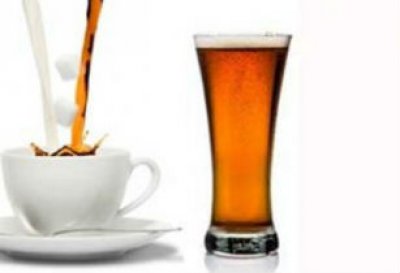Coffee or Beer? The Choice Could Affect Your Genome Coffee or Beer?

Coffee and beer are polar opposites in the beverage world. Coffee picks you up, and beer winds you down.
The scientists have discovered that the beverages may also have opposite effects on your genome. Working with a kind of yeast that shares many important genetic similarities with humans, the researchers found that caffeine shortens and alcohol lengthens telomeres — the end points of chromosomal DNA, implicated in aging and cancer.
Telomeres, made of DNA and proteins, mark the ends of the strands of DNA in our chromosomes. They are essential to ensuring that the DNA strands are repaired and copied correctly. Every time a cell duplicates, the chromosomes are copied into the new cell with slightly shorter telomeres. Eventually, the telomeres become too short, and the cell dies. Only fetal and cancer cells have mechanisms to avoid this fate; they go on reproducing forever.
Prof. Elizabeth Blackburn, which suggested that emotional stress causes the shortening of the telomeres characteristic of aging, presumably by generating free radicals in the cells. The researchers grew yeast cells in conditions that generate free radicals to test the effect on telomere length. They were surprised to find that the length did not change.
They went on to expose the yeast cells to 12 other environmental stressors. Most of the stressors — from temperature and pH changes to various drugs and chemicals — had no effect on telomere length. But a low concentration of caffeine, similar to the amount found in a shot of espresso, shortened telomeres, and exposure to a 5-to-7 percent ethanol solution lengthened telomeres.
To understand these changes, the TAU researchers scanned 6,000 strains of the yeast, each with a different gene deactivated. They then conducted genetic tests on the strains with the longest and shortest telomeres, revealing that two genes, Rap1 and Rif1, are the main players mediating environmental stressors and telomere length.
More laboratory work is needed to prove a causal relationship, not a mere correlation, between telomere length and aging or cancer, the researchers say. Only then will they know whether human telomeres respond to the same signals as yeast, potentially leading to medical treatments and dietary guidelines. For now, Prof. Kupiec suggests, "Try to relax and drink a little coffee and a little beer."